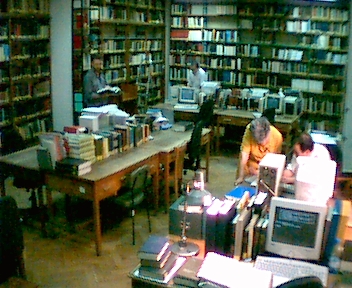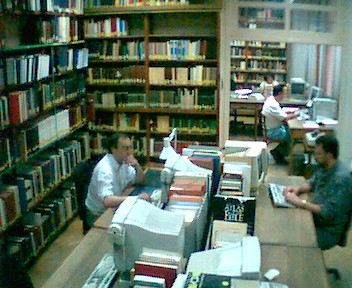Introduction
1. Short history of the project
The Greek-Spanish Dictionary (DGE) is the last link in the long chain of European lexicographical tradition of general dictionaries of Ancient Greek, the beginning of which can be considered Henricus Stephanus' Thesaurus Graecae Linguae (Paris 1572). The Greek-Spanish Dictionary resumes this tradition at the level reached by its immediate predecessor, Liddell-Scott-Jones (LSJ) dictionary, in its ninth edition (Oxford 1925-1940). Through many years this project, which is carried out in the Instituto de Lenguas y Culturas del Mediterráneo y Oriente Próximo (ILC) of the Centro de Ciencias Humanas y Sociales (CCHS) of the CSIC (Madrid), has got funds regularly from the Spanish Ministry of Education and Science (currently Ministry of Economy and Competitivity). It also has been supported at several moments by worthy Foundations, such as the March Foundation or the A.G. Leventis Foundation.
At the beginning the goals that we aimed at were not so ambitious as now. Having in mind a public consisting of university students, we basically attempted to adapt into Spanish the best existing Greek dictionaries. We also intended to supplement them in disregarded fields, replace their editions, frequently very old, with new, better ones; also, to correct eventual mistakes.
Nevertheless, at the very beginning of the work, we already noticed how the necessity was felt in the field of Classical Philology of a new bilingual dictionary from Ancient Greek into a modern language. Such a dictionary had necessarily to be based on a wider collection of materials, as well as on a new careful study and organization of those materials according to modern lexicographical criteria, taking profit of recent advances in linguistics. LSJ splendid dictionary, which our daily work makes us duly appraise, was, regrettably enough, in many senses out of date, in spite of its Supplements. Greek lexicon was thus in need of a thorough revision.
That revision involved, first, incorporating Mycenaean Greek and Patristic lexicon, as well as personal and place names, which were all absent from LSJ. Besides, the increasing mass of words showing up in new literary and documentary texts, new critical editions of well-known texts, and the necessary revision of their interpretation in the light of the current state of the art imposed writing up a dictionary with newly renovated bases. As for the etymological part, the tremendous development of Indo-European linguistics all along the 20th century had also to be taken into account.

Our goal in writing the DGE is, therefore, to provide a wide dictionary of authorities that keeps pace with modern developments in semantics and lexicography. It is designed to contain all relevant information on the lexicon of all Greek writers and documentary texts from Mycenaean times until the end of the antiquity. For that purpose, we make use of the most updated bibliography concerning lexicography, lexicology, semantics, linguistics, and etymology of Ancient Greek.
To mention just one significant figure, the extension of the DGE is approximately thrice that of LSJ. Further on, as we have already stated, the DGE entries are internally arranged according to modern semantic criteria. For any additional information on this matter, we make reference to the book Introduction to the Greek Lexicography, where the theoretical bases of the work are discussed. The forewords of the published volumes, as well as other writings by members of the team, can also provide interesting information on related matters.
Greek lexicon happens to be almost inexhaustible, which can seem odd enough for a so-called dead language. Steadily new words and new meanings appear in inscriptions, papyri and editions, and our knowledge of all of them keeps improving thanks to the efforts of many scholars, as shown in general or specific studies. The DGE makes use of modern editions of the ancient literary or documentary texts, and pays attention to the constant advances in their interpretation, as well. It demands a continued effort to constantly update our library with new reference editions of literary and documentary texts as well as new books concerning Greek lexicography (indexes, lexica, concordances, studies of various kind, etc.). We have to make even a greater effort to carefully study that huge bibliography so that it can be taken into account for the dictionary. Such efforts have tangible results, as the Bibliographical Repertorium of Greek Lexicography, published as volume III of the DGE supplementary series, as well as its Supplement, which can be found in this web page.
The task of editing such a dictionary has traditionally involved reading texts, indexes, concordances, lexica, annotated editions, and bibliography of various kinds, both books and articles. At a certain time, however, computers begun to be used with great profit as an additional tool for the various tasks involved, from the processing of the information and the gathering of materials to the final impression of the volumes.
Summing up, our efforts have focused on three main areas:
a) increasing the documentation, coming both from classical, late and Christian writers (until 600 AD in general), and documentary texts (inscriptions, papyri, ostraca, etc.); checking all quotations appearing in the Dictionary with the selected editions, and including the appropriate context and explanations; revising the lemmatization as well as the prosodical, graphical, and morphological information. All the information found in the Dictionary has been checked and modernized. This is crucial in order to avoid mistakes and imprecisions. The basic work of collecting materials is made not only for the volumes under preparation, but also for the whole work. Materials are collected directly from the texts, and also through dictionaries, lexica, and philological and lexicographical works of various kinds. We have been also using computers for that purpose for some years now.
b) internally organizing the entries according to semantic criteria - not logical, chronological nor occasional ones. The key for that is indeed the exit language, Spanish in our case - we try to establish in what contexts (linguistic or extralinguistic) a Greek word should be translated by a given Spanish word.
c) taking profit as far as possible of computerised resources - both for the search of materials and their storage and processing at the successive stages of preparation of each volume (writing the entries, revising quotations and entries, composing the volumes).
Computer science has opened up new possibilities and has made our work to a certain extent easier, so that our rhythm has increased. Nevertheless, it has also brought in new problems - not only technical ones -, for which we also have to search for solutions. For instance, the great mass of information provided by modern databases of Ancient Greek often requires - contrary to what could be expected - an additional critical effort. Using databases cannot replace at all the direct study of the sources and the bibliography, as well as the necessary amount of critical acumen that is usually required to organize complex entries. It may be significant to know that volume V and VI - the last ones published for the moment - include more than fifty thousand references each, selected from a corpus of millions of references.

The existence of such databases provides all Classical scholars (philologists, linguists, archaeologists, historians, etc.) with the possibility of comfortably consulting huge masses of data. This does not invalidate working on a dictionary like the DGE, but makes more evident its relevance, for those databases lack of all definition and lexicographical classification. In this context, the opportunity of a good bilingual dictionary, which provides a reasoned, contrasted and updated interpretation of the Ancient Greek lexicon is greater than ever. We would like to remark that a work of such an extension - wide but handy, including all the relevant information on Greek lexicon, even when not aiming at absolute comprehensiveness - will always remain necessary.
The work on the DGE was begun at a time when a long term team work in humanities was something quite unheard of in Spain. After all these years, we are satisfied that the project has consolidated and enjoys great prestige both in Spain and abroad. This is proved by a growing presence in the scientific literature, among others. In numerous books and magazine articles the DGE is mentioned, taking it as reference for all types of studies. Our contribution to Classical Philology as well as to the General Lexicography has been repeatedly acknowledged by our reviewers.
We would like to highlight as a significant qualitative change the fact that in the last years the DGE has not only acquired the consideration of an "indispensabile strumento di lavoro" (G. Pugliese-Carratelli, PP 50, 1995, p.79), a "substantial improvement on LSJ" (J. Chadwick, BICS 39, 1994, p.10) or a "für die internationalen Gräzistik förderliches Unternehmen" (H. Schwabl, WS 100, 1987, p.318), but it appears as a canonic, standard dictionary in big reference works. Two important works that acknowledge their debt with our reference system are, for instance, the monumental Lexicon of Greek Personal Names, directed by P.M. Fraser and E. Matthews (Oxford 1987 ss.), and mainly the Revised Supplement of LSJ, by our colleague P. Glare (Oxford 1996), who in his introduction writes that he has profitably revised the entries of the published volumes of the DGE. The authors of the Lexikon zur byzantinischen Gräzität, of Vienna, refer to the DGE systematically in those entries for which the DGE contains additional documentation to what they offer, according to their rigurous selection criteria.
2. Current Staff
Editor in chief
F. R. Adrados, Doctor vinculado ad honorem del CSIC. Catedrático Emérito de Universidad
CSIC Researchers
- Elvira Gangutia Elícegui, Profesora de Investigación (jubilada)
- Dolores Lara Nava, Investigadora Científica (jubilada)
- Helena Rodríguez Somolinos, Investigadora Científica
- Juan Rodríguez Somolinos, Investigador Científico (IP)
- Sara Macías Otero, Contratada
- Greta Kadás, Becaria FPI
Colaboradores del proyecto
- María Luisa Alía Alberca
- Sabine Arnaud-Thuillier
- Pilar Boned Colera
- Pablo A. García Pastor
- Eugenio R. Luján Martínez
- Dolores Martín Rodríguez
- Jorge Martínez de Tejada Garaizábal


